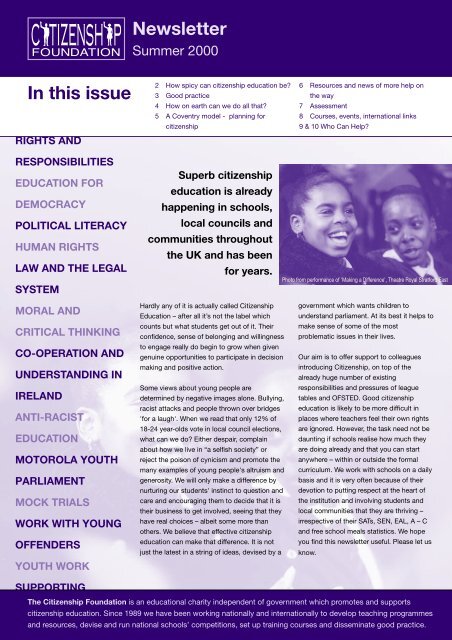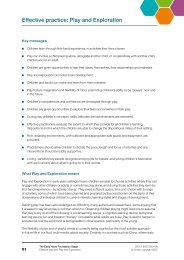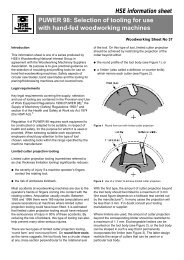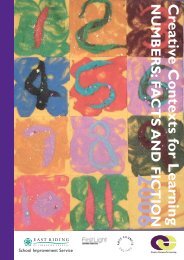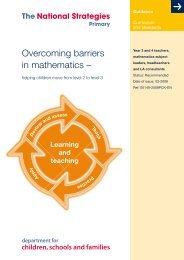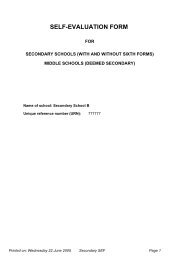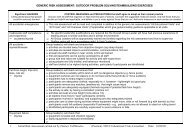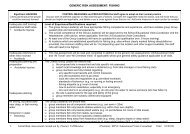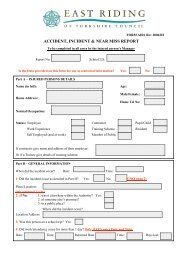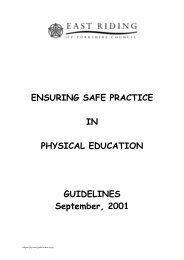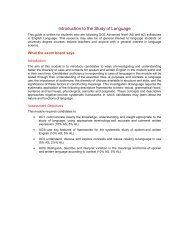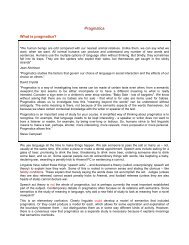the Citizenship Foundation's newsletter - eRiding
the Citizenship Foundation's newsletter - eRiding
the Citizenship Foundation's newsletter - eRiding
Create successful ePaper yourself
Turn your PDF publications into a flip-book with our unique Google optimized e-Paper software.
NewsletterSummer 2000In this issueRIGHTS AND2 How spicy can citizenship education be?3 Good practice4 How on earth can we do all that?5 A Coventry model - planning forcitizenship6 Resources and news of more help on<strong>the</strong> way7 Assessment8 Courses, events, international links9 & 10 Who Can Help?RESPONSIBILITIESEDUCATION FORDEMOCRACYPOLITICAL LITERACYHUMAN RIGHTSLAW AND THE LEGALSYSTEMSuperb citizenshipeducation is alreadyhappening in schools,local councils andcommunities throughout<strong>the</strong> UK and has beenfor years.Photo from performance of 'Making a Difference', Theatre Royal Stratford EastMORAL ANDCRITICAL THINKINGCO-OPERATION ANDUNDERSTANDING INIRELANDANTI-RACISTEDUCATIONMOTOROLA YOUTHPARLIAMENTMOCK TRIALSWORK WITH YOUNGOFFENDERSYOUTH WORKSUPPORTINGHardly any of it is actually called <strong>Citizenship</strong>Education – after all it’s not <strong>the</strong> label whichcounts but what students get out of it. Theirconfidence, sense of belonging and willingnessto engage really do begin to grow when givengenuine opportunities to participate in decisionmaking and positive action.Some views about young people aredetermined by negative images alone. Bullying,racist attacks and people thrown over bridges'for a laugh'. When we read that only 12% of18-24 year-olds vote in local council elections,what can we do? Ei<strong>the</strong>r despair, complainabout how we live in “a selfish society” orreject <strong>the</strong> poison of cynicism and promote <strong>the</strong>many examples of young people's altruism andgenerosity. We will only make a difference bynurturing our students' instinct to question andcare and encouraging <strong>the</strong>m to decide that it is<strong>the</strong>ir business to get involved, seeing that <strong>the</strong>yhave real choices – albeit some more thano<strong>the</strong>rs. We believe that effective citizenshipeducation can make that difference. It is notjust <strong>the</strong> latest in a string of ideas, devised by agovernment which wants children tounderstand parliament. At its best it helps tomake sense of some of <strong>the</strong> mostproblematic issues in <strong>the</strong>ir lives.Our aim is to offer support to colleaguesintroducing <strong>Citizenship</strong>, on top of <strong>the</strong>already huge number of existingresponsibilities and pressures of leaguetables and OFSTED. Good citizenshipeducation is likely to be more difficult inplaces where teachers feel <strong>the</strong>ir own rightsare ignored. However, <strong>the</strong> task need not bedaunting if schools realise how much <strong>the</strong>yare doing already and that you can startanywhere – within or outside <strong>the</strong> formalcurriculum. We work with schools on a dailybasis and it is very often because of <strong>the</strong>irdevotion to putting respect at <strong>the</strong> heart of<strong>the</strong> institution and involving students andlocal communities that <strong>the</strong>y are thriving –irrespective of <strong>the</strong>ir SATs, SEN, EAL, A – Cand free school meals statistics. We hopeyou find this <strong>newsletter</strong> useful. Please let usknow.The <strong>Citizenship</strong> Foundation is an educational charity independent of government which promotes and supportscitizenship education. Since 1989 we have been working nationally and internationally to develop teaching programmesand resources, devise and run national schools’ competitions, set up training courses and disseminate good practice.
STAFF22summer 2000Jan NewtonCEODon RoweDirector ofCurriculumResourcesHow spicy cancitizenship education be?Fiona HogarthAdministratorSumita AliAssistantAdministratorThere is a fear that citizenship willbe bland and uninteresting,lacking ei<strong>the</strong>r spice or diversity(Lat Blaylock, TES 24/3/00). Thecurriculum was created accordingto an adult agenda and willcolour that comes from using realcase studies which grab <strong>the</strong>attention. Students need tounderstand both how <strong>the</strong> lawimpacts on ordinary people butalso why it is important to knowteachers – if citizenshipreverts to dull oldfashionedcivics.Students will vote with<strong>the</strong>ir feet if it does. It isup to all of us, whe<strong>the</strong>r inKathleenBennettPA to CEOcertainly fail if it is delivered in afinger wagging way. However, ifwe get it right, citizenship canabout <strong>the</strong>ir rights andresponsibilities. The skills throughcontent approach should<strong>the</strong> classroom or not, toshare our ideas andmake it work.Vikki CarterMagistrates'CourtCompetitionOrganiserMichael GrimesPublications &InformationOfficerprovide teachers with <strong>the</strong>opportunity to devise a curriculumthat students will see as relevant,interesting and useful. During <strong>the</strong>development of our material onlegal rights and responsibilities,80% of students said <strong>the</strong>y found<strong>the</strong> work interesting and over 95%of <strong>the</strong>m found it worthwhile toencourage critical thinking anddiscussion of <strong>the</strong> problematicaspects of specific laws (such as‘in whose interest was <strong>the</strong> lawwritten?’ ‘should it be scrappedaltoge<strong>the</strong>r?’). Students need to beable to recognise injustice and <strong>the</strong>danger of unthinking obedience.Discussions like <strong>the</strong>se are notThe National Curriculumfor pupils aged five to 11and 11 to 16 can befound on <strong>the</strong> NationalCurriculum web site atwww.nc.uk.netTed HuddlestonCurriculumDevelopmentOfficerTrevor LunnessYoung OffendersProject OfficerGraham Morris<strong>Citizenship</strong>DevelopmentOfficerPiya MuqitLinklatersProject OfficerCarrie SuppleProject SupportOfficer(Britannia)Tony ThorpeProjectConsultantlearn about <strong>the</strong> law.We at <strong>the</strong> <strong>Citizenship</strong> Foundationhave always tried to produceresources which are activitybased,rooted in young people'sexperience and well trialled in <strong>the</strong>classroom. We are now trying tomake sure that an exciting rangeof new material is available toschools before <strong>the</strong> new ordersbecome statutory in 2002. Forexample, we are developingclassroom resources to support<strong>the</strong> Young Citizen’s Passportwhich young people haveconsistently told us is highlyaccessible and full of invaluableinformation for <strong>the</strong> young citizen.Information heavy lessons (suchclassroom rehearsals of debateswhich students might one dayhold for real. We do not seecitizenship education aspreparation for citizenship. Itengages young people as citizenshere and now.During a recent INSET, we askedteachers to look at <strong>the</strong> contents of<strong>the</strong> new orders and decide whichaspects <strong>the</strong>y felt to be <strong>the</strong> mostimportant. Overwhelmingly, it was<strong>the</strong> area of rights andresponsibilities which colleaguesfelt was <strong>the</strong> most importantcomponent. Coming a closesecond was understanding <strong>the</strong> UKas a pluralist, diverse society and<strong>the</strong> need for mutual respect andunderstanding. Third was <strong>the</strong>We phoned staffrooms around<strong>the</strong> UK for comments on <strong>the</strong>idea of <strong>Citizenship</strong> Education.Staff responses appearthroughout <strong>the</strong> <strong>newsletter</strong>.“It is something I’m lookingforward to… The <strong>Citizenship</strong>Foundation has beenproducing materials tosupport teachers for yearsand made a phenomenalcontribution to citizenshipeducation with its promotionof <strong>the</strong> mock trialscompetitions, providing atremendous opportunity forpupils.”Special thanksto Iris Burton,John Hayward,Fiona Hogg andEddie Parkinsonas a plough through <strong>the</strong> details of<strong>the</strong> Sex Discrimination Act) can beboth difficult for <strong>the</strong> teacher andindigestible for students. The dietmust be laced with <strong>the</strong> kind ofimportance of resolving conflictsfairly. These are important areasand will need creative strategies inorder to be realised. It will not bein anyone’s interest – least of all“I know absolutely nothingabout it I’m afraid”
summer 2000 3Good practiceIf you are interested in ideas for developing your citizenship education, you might like to visit ourwebsite (www.citfou.org.uk). We collect and disseminate examples of good practice in primary andsecondary schools, local councils, communities and non-governmental organisations, including:●developing a whole school●human rights-based teaching●using <strong>the</strong> web for dialogueethosbetween schools●working with refugees●good citizenship in <strong>the</strong>●organising a <strong>Citizenship</strong> orplayground●history and citizenshipHuman Rights Day●working with creative arts●global citizenship●talking about sexuality●anti-bullying campaigns●anti-racism●<strong>the</strong>atre and citizenship●mutual respect●improving communication●running a youth parliamentand consultationcompetition across <strong>the</strong>●working with parentscurriculum●UK school link with Ghana●developing <strong>the</strong> school councilAll examples include contact●intergenerational workdetails. We are aware of <strong>the</strong>●links with Save <strong>the</strong> Childrentremendous range of good●RE and <strong>Citizenship</strong>practice and urge you to let us●partnership with your localknow about yours. Students arecouncil●organising a referendumwelcome to make enquiries andwe plan to include articles and●peer mediation●increasing young people’sinformation written by and forparticipation in localstudents in future issues, so that●volunteering in <strong>the</strong>governmentyoung people can access ideascommunityand each o<strong>the</strong>r.“I haven't given it muchYear 6 lunchtimehelpers at DogKennel HillPrimary School,Southwark. Theyare trained tothought… I'm just socaught up withadministration and day today issues…”look out for anyupset or lonelystudents, andcan be identifiedby a yellow sash.“Anything that supports<strong>the</strong> rights of young peoplehas to be a good thing”
4summer 2000<strong>Citizenship</strong> Education:How on Earth can we do all that?That is <strong>the</strong> question being posed in schools up and down <strong>the</strong> country. How do we plan for high qualitycitizenship education for all, in a way that has progression and real significance in <strong>the</strong> lives of our pupils?Clearly citizenship is about far more than curriculum provision alone. It is also about <strong>the</strong> rights of students andstaff, how <strong>the</strong>y treat each o<strong>the</strong>r and who is listened to and valued. Each school can make its own decisionsabout <strong>the</strong> how, <strong>the</strong> who and <strong>the</strong> what and <strong>the</strong> answers depend on its unique circumstances: staff, students,resources, ethos, community. The ‘What’ refers to resources, experience and methodology, which is dealt wi<strong>the</strong>lsewhere in this <strong>newsletter</strong>. As to <strong>the</strong> ‘How’ and ‘Who’, you might want to consider <strong>the</strong> following examples asstarting points:HOWThe structures through which <strong>the</strong><strong>Citizenship</strong> curriculum will bedeliveredCross-curricularNB – <strong>the</strong> <strong>Citizenship</strong> orders includesuggested subject linksIntegrated with PSHE and / ordiscrete modules within PSHESelf-standing <strong>Citizenship</strong> coursesAdapted HumanitiescoursesSpecial events / experientialcompetition / community eventsWHOIdentifying <strong>the</strong> most appropriatepeople to prepare and ensure deliveryAll teachers of relevant subjectsPSHE teachers, often form tutors withoccasional externalspeakers / visitors / specialistsSelf-selected <strong>Citizenship</strong> specialists,building on existing experienceHumanities teachersAll staff?Events organisersADVANTAGES / DISADVANTAGES• Avoids finding new time slot• Can say that everyone is involved• Problems of co-ordination• <strong>Citizenship</strong> could get lost incurriculum• <strong>Citizenship</strong> issues grafted on toalready full syllabuses• Uses existing time slot• Many teachers already negativeabout PSHE. Might see <strong>Citizenship</strong>as unwelcome extra burden• Possible time pressure• Enthusiastic staff• Team approach – productiveEnables coherent planning• Rest of staff might feel <strong>the</strong>y have• no obligation to <strong>Citizenship</strong>Needs to be consistent with whole• school ethos• Lends itself well to certain aspectsof <strong>Citizenship</strong>, eg working ofparliament• May not involve whole school• Impact / fun• Takes <strong>Citizenship</strong> away from beingjust ano<strong>the</strong>r subject• Superficial? Not enough time toreflect?• Excellent / essential complementto curriculum-based citizenshipeducationFrom our contact with schools, it is clear that most are considering a combination of <strong>the</strong> above approaches –most often within a PSHE/<strong>Citizenship</strong> framework and <strong>the</strong> Humanities. In our experience, a solely crosscurricularstrategy cannot deliver a citizenship course to all students. Ideally, in <strong>the</strong> long term, a specialist teamof staff working in discrete lesson time (however labelled), with key concepts and skills reinforced elsewhere in<strong>the</strong> curriculum (arts, humanities, RE, science and technology) is most likely to deliver effectively.Of course, whichever way you choose, we can support and advise you.
PSHE and <strong>Citizenship</strong>curriculum map foroverallConstructing anschoolssecondaryandprimaryforauditancompiledWecurriculum.<strong>Citizenship</strong><strong>the</strong>deliveringofwaysdevisingbusyareLEAsandschoolsdepartments,staff,Individualteachersandadvisersteam ofabycreatedwasbelow whichmodel<strong>the</strong>includedhaveWe(www.citfou.org.uk).websiteouronitfindcanYouteachers.withconsultationinforlookingcolleagueshelphopefullywillandcurriculum workformalaswellaseventsspecialandethosschoolaboutthinktoschoolsencouragesItCoventry.inuseful.foundhaveyouframeworksplanningo<strong>the</strong>ranywithuscontactPleasestart.tosomewhereyearTargetgroupPSHE or<strong>Citizenship</strong>AspectK/U,oftermsin–unitsor(topicsvalues)orskillsissues,concepts,aspectproviding forofwaysossibleP foNo.hoursorAdvantagesdisadvantagesDiscretetimeThrougho<strong>the</strong>rsSpecialeventsethosSchoolEE X A M P L10earY hotB gUnderstandin/Knowledge<strong>the</strong>parliament,ofworkTheandmakingincourts& <strong>the</strong>governmentlaw.<strong>the</strong>shapingConceptsequality.fairness;justice;Democracy;Skillsviews;ofevaluationcriticalDebate;express,issue;topicalaresearchopinion;andefendandjustifydiscussion.tocontribute-Drugseg:choices/legalisecannabisdebaterulingsCourte.g.Gillick(<strong>the</strong>ruling*underforPillolds)year16Pressuregroups/MPslawsMainaffectingyoungpeople*e.g.HistoryfoundingHitlerNHS;andcourts/laws*e.g.REEuthanasia*,Abortion*e.g.GeogEnvironmentlaw*e.g.ScienceGMlaw onfoodYouthParliamentcompetitionTheatree.ggroupaMakingDifference*OutsideorganisationsBritishe.g.YouthCouncil*,88*,CharterHansardSociety*,OperationVote*BlackEveryoneininvolveddecisionandmakingto-rulesdevelopofimportance/consultationdemocracyandFairnessconsistencyapplicationinrulesofSchoolcouncils/linksYouthwithForumsneededisCo-ordinationelementcore<strong>the</strong>Unlessintaughtistopic<strong>the</strong>oftime,PSHE/<strong>Citizenship</strong>nobewill<strong>the</strong>reallforentitlementco-<strong>Citizenship</strong>NeedsupportoffertoordinatortoteacherssubjectfornotareissuesensurerepeatedtodifficultbeMightinstudentsallinvolveeventsspecial<strong>the</strong>seoninformationhasFoundation<strong>Citizenship</strong>*The
6summer 2000ResourcesGood Thinking: Education for<strong>Citizenship</strong> and MoralresponsibilityThree courses of study for KeyStages 3, 4 and 5. Introducesstudents to moral ideas, languageand debate underpinningcitizenship. Encourages criticalthinking.(In preparation – published byEvans Bro<strong>the</strong>rs due autumn 2000)by T. Huddleston and D. Rowe<strong>Citizenship</strong> For AllA wide-ability resource bookcovering many personal, socialand citizenship issues.Edited by Don Rowe, published1998 by Stanley Thornes, £35ISBN 0-7487-3196-2Charity mattersActivities to help studentsunderstand <strong>the</strong> role and work ofcharities and issues underlyingcharitable giving.By Tony Thorpe, published byDirectory of Social Change, £9.95ISBN 1-900360-41-1Young Citizen’sPassportAn award-winningcomprehensiveguide to <strong>the</strong> law foryoung people.Includes: health,home, law, leisure,safety, travel and work.Edited by Tony Thorpe, publishedby Hodder and Stoughton£3.99 with large discounts for bulkpurchaseISBN 0-340-78076-2Understand <strong>the</strong> Law2nd edition, 1995Four volumes of active learningunits covering all aspects of <strong>the</strong>law as it affects young people athome, school, work, shopping andin personal relationships.Limited numbers available from<strong>the</strong> <strong>Citizenship</strong> Foundation @ £15eachEdited by Don Rowe and TonyThorpe, published by Hodder andStoughtonThe National Foundation forEducational Research is in <strong>the</strong>process of compiling acomprehensive list of currentmaterials and those beingdeveloped – in written, audio-visualand ICT form – for <strong>Citizenship</strong>Education. The intention is to putthis information on <strong>the</strong> NationalGrid for Learning (NGfL) in <strong>the</strong> nearfuture. You can access ourextensive resources list(www.citfou.org.uk)More help on its way for <strong>Citizenship</strong>Although it has not been widelypublicised as yet, <strong>the</strong>re isconsiderable work underway toassist schools in implementing<strong>the</strong> new <strong>Citizenship</strong> curriculumin both primary and secondaryschools, writes David Kerr.The DfEE has set up a <strong>Citizenship</strong>Education Working Party to tackleimplementation issues. Itsmembers are drawn from schools,LEAs, support organisations andinclude a number of people whowere on <strong>the</strong> original <strong>Citizenship</strong>Advisory Group. The WorkingParty has established sub-groupsto look in more detail at <strong>the</strong>pressing issues of assessmentand accreditation, teacher training,community involvement and <strong>the</strong>sharing of good practice.The latter sub-group involvesdiscussion of a site for <strong>Citizenship</strong>on <strong>the</strong> National Grid for Learning(NGfL). The aim is to produce apackage of recommendations andmaterials from <strong>the</strong> sub-groups toassist schools. This will be madeavailable by September 2001 at<strong>the</strong> latest, giving secondaryschools a fur<strong>the</strong>r year to preparefor September 2002 when<strong>Citizenship</strong> acquires <strong>the</strong> status ofa National Curriculum subject.So <strong>the</strong> message is – you are notalone. There is plenty of time toreview your existing provision andplan for 2002. More help will beavailable as <strong>the</strong> sub-groups report,new resources emerge and moneyfor training and implementation isallocated.David Kerr is a member of <strong>the</strong><strong>Citizenship</strong> Education WorkingParty and Senior Research Officerfor <strong>the</strong> NFER (National Foundationfor Education Research)
summer 2000 7Assessment – is it an issue?EVERYONE KNOWS that schools have lost a good deal of <strong>the</strong> freedom <strong>the</strong>y once had toexperiment or develop innovative courses without having to assess pupils’ progress or provideaccreditation. Should schools see <strong>the</strong> new <strong>Citizenship</strong> framework as providing <strong>the</strong> freedom tointroduce pupils to important skills and issues free of <strong>the</strong> restriction of a rigid syllabus and formalexamination? A dreary exam syllabus would kill it stone dead.However, pupils are surely entitled to some credible form of feedback for <strong>the</strong> work <strong>the</strong>y do. Ifit’s worth doing, is it not worth assessing? All teachers are familiar with <strong>the</strong> difficulties of takingnon-exam lessons because ‘<strong>the</strong>y don’t matter’. And with <strong>the</strong> best will in <strong>the</strong> world, many teacherswill take more seriously those subjects for which <strong>the</strong>ir pupils are going to take an external exam.Recent experience with <strong>the</strong> short course GCSE suggests that pupil motivation can improveif <strong>the</strong>re is something tangible to be gained at <strong>the</strong> end. Certainly <strong>the</strong> statutory orders provide aframework which is broad enough to be <strong>the</strong> basis of ei<strong>the</strong>r a full or short course GCSE in<strong>Citizenship</strong>. Advances in examination techniques, including course work and skills-basedassessment can surely make <strong>the</strong>ir contribution to provide stimulating and relevant courses.Publication of new syllabuses is expected later this year.It will be vital to monitor <strong>the</strong> effects on teaching styles and learning outcomes for schools decidingto go down <strong>the</strong> public examination route. Will all interest and spontaneity be stifled or will <strong>the</strong>status of <strong>the</strong> whole area be significantly raised and, with it, pupils’ achievement? One of <strong>the</strong>arguments against formal assessment is that those who don’t pass will be labelled ‘failed citizens’.We know <strong>the</strong>re are numerous ways to gauge achievement and would very much like to hear yourideas and experience. Careful planning and good resource material which starts with <strong>the</strong>experience and concerns of young people will be essential to avoid a return to <strong>the</strong> old failed‘top down’ civics approach.“In <strong>the</strong>ory <strong>the</strong> curriculum is brilliant”
Professional development – now <strong>the</strong> priorityThe <strong>Citizenship</strong> Foundation organises and contributes to a variety of inservicetraining events. We are now planning a considerable expansion oftraining and development activity, including regional one-day seminar/workshop-based conferences during <strong>the</strong> second half of <strong>the</strong> summer term(see dates below). Issues to be addressed will include: whole schoolpolicy; curriculum alternatives; democratic involvement; political literacy;human rights education; moral education; review of resources.“We need agreement on whatmakes a good citizen and wemust have expert help andgood quality resources. The<strong>Citizenship</strong> orders mightsound brilliant – but <strong>the</strong>important thing is making itwork in a practical way”3 July Bristol University5 July Leeds Metropolitan University7 July London: The Charity Centre10 July Loughborough: The Co-operative College, Stanford HallFor more information contact Graham Morris at<strong>the</strong> <strong>Citizenship</strong> Foundation.“If teachers don’t teachcitizenship anyway, <strong>the</strong>yprobably shouldn’t beteaching”North–South School LinksStudents at Key Stages 3 & 4 will explore '<strong>the</strong> world as a globalcommunity'. The orders stress <strong>the</strong> importance of developing skills ofenquiry, communication, participation and responsible action.North–South Linking can be used as a means of encouraging youngpeople to explore and learn from <strong>the</strong>ir peers in Africa, Latin America, <strong>the</strong>Caribbean and South Asia.Contact <strong>the</strong> World Links Team at: The Central Bureau, 10 Spring Gardens,London SW1A 2BN Tel: 020 7389 4503 www.wotw.org.ukConferencesTIDE (Teachers in DevelopmentEducation)University of Birmingham, Saturday10 June 2000Contact DEC (Birmingham): 0121 4723255 info@tidec.org“The idea is nice, but itseems a bit nannying, a bitBig Bro<strong>the</strong>rish”“I'm glad it's compulsory andenables you to construct aninteresting teaching course,but it must be a separatesubject, with specialistteachers and INSET – <strong>the</strong>yshould prescribe skills andpedagogy”Oxfam Education Global<strong>Citizenship</strong>University of Hertfordshire, 30 June &1 July 2000Contact Clare Gardner or MaryYoung: 020 7931 7660Education in Human RightsNetwork: 'Overcoming Barriers toParticipation'University College of Ripon and York,York, 14–16 July 2000Contact Chrissie Dell or Emi Kimura:01904 716839global.ed@dial.pipex.comYear 11 students from Highbury FieldsSchool, Islington, at <strong>the</strong> AmnestyInternational table for <strong>the</strong>ir 'Volunteers in<strong>the</strong> Community' fair.We want to provide whatever information you tell us will be most useful in future <strong>newsletter</strong>s. Please contact:Carrie Supple, <strong>the</strong> <strong>Citizenship</strong> Foundation, 15 St Swithins Lane, London EC4N 8AL.Tel: 020 7929 3344 Email: info@citfou.org.uk Website: www.citfou.org.uk
useful resources<strong>Citizenship</strong> Education –Who Can Help?Amnesty InternationalHuman Rights Education .99 Roseberry Ave, London EC1R 4RETel. 020 7814 6200www.amnesty.org.ukAnne Frank Educational TrustTouring exhibition antisemitism/racism/discrimination/anti-racism.POB 11880, London N6 4LN Tel. 0208340 9077 www.annefrank.org.ukAnti-Slavery InternationalOffers workshops, resources andtraining in human rights issues, linkingdirectly to <strong>the</strong> curriculum.Thomas Clarkson House, TheStableyard, Broomgrove Road,London SW9 9TL Tel. 020 7501 8920www.antislavery.orgBirmingham DevelopmentEducation CentreResources, contacts, projects. Global,environmental, political issues.998 Bristol Road, Selly Oak,Birmingham B29 6LE Tel. 0121 4723255British Youth CouncilPeer education, youth councils,parliament, policy, decision making,crime.2 Plough Yard, Shoreditch High Street,London EC2A 3LP Tel. 020 7422 8640www.byc.org.ukCentre for <strong>Citizenship</strong> Studies inEducationIn partnership with schools, LEAs, <strong>the</strong>voluntary sector and o<strong>the</strong>rorganisations. Classroom activities,research, resources, information,training – including financial literacyand race equality.University of Leicester, 21 UniversityRoad, Leicester LE1 7RF Tel. 01162523681 www.le.ac.uk/education/centres/citizenship/cs.htmlChangemakersHelps young people to set up projectsfor bringing about positive change in<strong>the</strong>ir lives.Baybrook Farm, Lower Goodney, NrWells, Somerset BA5 1RZ Tel. 01458834767Charter 88Democracy/rights and responsibilities/voting/constitution/participation/democracy.16 – 24 Underwood St, London N17JQ Tel. 020 7684 3878www.charter88.org.ukCharter88 also set upwww.citizen21.org.uk as a one-stopshop for a range of citizenshiporganisations, resources, links, events.Information on Bill of Rights, voting,parliament, freedom of information .Centre for Global EducationWorks with teachers and teachereducators to include a globalperspective in <strong>the</strong> curriculum.College of Ripon and York St.John,Lord Mayor’s Walk, York YO3 7EX Tel.01904 – 716839<strong>Citizenship</strong> FoundationResources for all ages, research,information, training, national, mocktrial and youth parliamentcompetitions – all aspects ofcitizenship, including law-related andmoral education.Ferroners House, Shaftesbury Place,off Aldersgate Street, London EC2&8AA Tel: 020 7367 0500www.citfou.org.ukCommission for Racial EqualityWorks in partnership with individualsand organisations for justice, diversity,equality.Elliott House, 10 -12 Allington St,London SW1E (Education Tel. 0207932 5200) www.cre.gov.ukCommunity Service VolunteersActive learning in <strong>the</strong> school and localcommunity. Training and materials.Awards schemes.237 Pentonville Road, London N1 9NJTel. 020 7278 6601 www.csv.org.ukCouncil for Education in World<strong>Citizenship</strong>Resources, broadsheets oninternational issues, information,training. Global and multi-culturalcitizenship. Organisers of Model UNevents.Sir John Lyon House, 5 High TimberStreet, London EC4V 3NSwww.cewc.org.ukDevelopment Education AssociationNational umbrella body supportingand promoting raising awareness andunderstanding of global anddevelopment issues in <strong>the</strong> UK. Staffcan advise you on details of your localDevelopment Education Centre.3rd Floor, 29–31 Cowper St, LondonEC2A 4AP Tel. 020 7490 8108www.dea.org.ukEducation in Human Rights NetworkBrings toge<strong>the</strong>r educationalists,activists and lawyers concerned aboutpromoting human rights in schools.Centre for Global Education, Collegeof Ripon and York St. John, LordMayor’s Walk, York YO3 7EXTel. 01904 656771 www.hrea.orgEuropean Resource CentreProvides information on Europe andsupport for <strong>the</strong> development of <strong>the</strong>European dimension in <strong>the</strong> curriculum.The Central Bureau, The BritishCouncil, 10 Spring Gardens, LondonSW1A 2BN Tel. 020 7389 4733/23Friends of <strong>the</strong> EarthEducational resources designed tohelp young people develop anunderstanding of <strong>the</strong> environment andsupport active citizenship for bothformal and informal education sectors.26 Underwood St, London N1 7JQTel. 020 7490 1555 www.foe.co.ukGlobal ExpressRapid response information series forschools on world events in <strong>the</strong> news.Room 2, Panos Institute, 9 White LionSt, London N1 9PD Tel. 020 72781111 www.dep.org.uk/globalexpressThe Hansard SocietyPromotes knowledge of Parliamentarydemocracy, resources, mockelections, conferences.St Philips Building North, SheffieldStreet, London WC2A 2EXTel. 020 7955 7478 www.hansardsociety.org.ukInstitute for <strong>Citizenship</strong>Research, development projects,especially for junior schools andprojects encouraging greater voterparticipation.62 Marylebone High St, London W1M3AF Tel. 020 7935 4777www.citizen.org.uk…Continued overleaf…
useful resourcesJMU Foundation for <strong>Citizenship</strong>School-based Good <strong>Citizenship</strong>Awards, especially in Merseyside,public lectures, resources.Liverpool John Moores University,Roscoe Court, 4 Rodney Street,Liverpool L1 2TZTel. 0151 231 3852 www.livjm.ac.uk/citizen/Kick It OutCampaign to eradicate racism infootball in partnership with national,local, professional and amateurgroups.Business Design Centre, 52 UpperStreet, London N1 OQH Tel. 020 72886012 www.kickitout.orgNational Consumer CouncilRepresents <strong>the</strong> interest of consumers,particularly disadvantaged groups insociety. Global implications forconsumer actions. NCC is currentlyworking with <strong>the</strong> Institute for<strong>Citizenship</strong> to develop resources forKS3.20 Grosvenor Gdns, London SW1WODH Tel. 020 7881 3049www.ncc.org.uk (education site pagessoon)National Youth AgencyPromotes young people’s involvementin democracy/ youth policy andprovision/resources on racism, sexualexploitation, independent living,confidence.17–23 Albion St, Leicester LE1 6GDTel. 0116 285 3700 www.nya.org.ukOne World TrustEducating young people and <strong>the</strong> widerpublic about <strong>the</strong> UN, international lawand world government. Offersspeakers and resources.505 Norman Shaw North, LondonSW1A 2JFOperation Black VoteEncourages and inspires greaterpolitical participation from <strong>the</strong> UK’sAfrican, Caribbean and o<strong>the</strong>r ethnicminorities.16 – 24 Underwood St, London N17JQ Tel 020 7833 1988www.obv.org.ukOxfam Education UnitPromotes global citizenship as awhole school <strong>the</strong>me. Teachers canborrow and order resources from <strong>the</strong>resources base and can use it as adrop-in research centre (Mon. andWed. 2 – 6 p.m. all year. O<strong>the</strong>r timesby arrangement).4th Floor, 4 Bridge Place, LondonSW1V 1XY Tel. 020 7931 7660www.oxfam.org.uk/coolplanet/Parliamentary Education UnitInformation for students and teachersabout <strong>the</strong> work of Parliament.Room 604, Norman Shaw Buildings(N), London SW1A 2TT Tel. 020 72192105 www.explore.parliament.ukRefugee CouncilThe largest organisation helpingrefugees in <strong>the</strong> UK. Includes aneducation department.3 Bondway, London SW8 1SJ Tel. 0207820 3000 www.refugeecouncil.org.ukRunnymede TrustIndependent think tank on racerelations, ethnicity and culturaldiversity, pan-European contacts.11 Princelet St, London E1 6QH Tel.020 7600 9666 www.fhit.org/runnymedeSave <strong>the</strong> Children FundAn organisation for children, dedicatedto championing <strong>the</strong>ir rights andmaking a real difference to <strong>the</strong>ir lives.SCF has regional offices in <strong>the</strong> UKrunning local projects, often inpartnership with schools andcommunities.17 Grove Lane, London SE5 8RDTel. 020 7703 5400www.save<strong>the</strong>children.org.ukSchool Councils UKExperienced training and supportagency in <strong>the</strong> area of school/ classcouncils. For staff and students.57 Etchingham Park Road, London N32EB Tel. 020 8349 2459www.schoolcouncils.orgThe 1990 TrustNational Black organisation set up toprotect and pioneer <strong>the</strong> interests ofBritain’s Black communities.Winchester House, Rm12, 9 CranmerRoad, Kennington Park, London SW96EJ Tel. 020 7735 9010www.blink.org.ukTrentham BooksSpecialises in equal opportunities,citizenship, supporting bilingualchildren’s learning and social justice.Westview House, 734 London Road,Oakhill, Stoke-on-Trent, Staffs ST45NPTel. 01782 745567 www.trenthambooks.co.ukUNICEFFocusing on <strong>the</strong> United NationsConvention on <strong>the</strong> Rights of <strong>the</strong> Childand its relevance to <strong>Citizenship</strong>Education.55 Lincoln’s Inn Fields, London WC2A3NB Tel. 020 7405 5592www.unicef.org.ukUPFRONTBroad range of PSHE and <strong>Citizenship</strong>resources available free of charge.Bounty House, Vinces Road, Diss,Norfolk IP98 6BBTel. 01379 649500OTHER WEBSITESNewswisewww.ndirect.co.uk/~sapere/NewswiseFree educational resources. Designedto improve literacy, encouragethoughtful discussion and promotecitizenship. Based on topical storiesselected from <strong>the</strong> national press e.g.work on <strong>the</strong> Stephen LawrenceInquiry. Prejudice, stereotypes etc.Questions and activities. Aimed atprimary and secondary schools. Mixedability. Includes a discussion forum.Re:membering Educationwww.remember.mcmail.comAimed at teachers and lecturers. Todevelop creativity, sense ofresponsibility, spirituality, emotionalliteracy. Encourages parents andcommunities to work toge<strong>the</strong>r.Newsletter. Ideas. Themes. Crosscurricularwork. INSET andConferences advertised. Games.Assemblies. Subject by subject lessonideas.Britkidwww.britkid.orgLively. Original. Aimed at youngpeople whose home or school is not inan ethnically mixed area. About race,racism and life. Interactive. Features agroup of 9 young British people withdifferent backgrounds living in“Britchester”. User chooses who tomeet and is introduced to <strong>the</strong>ir home,friends, life, religion. Author (ChrisGaine) discusses dilemmas re.stereotyping, languageChildren’s Expresswww.childrens-express.org/Works with young people 8 – 18,interested in journalism and issues.The news agency produces news andcomment by children, for everyone.Recent stories e.g. fa<strong>the</strong>rs in prison.


